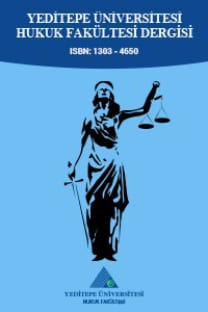THE IMPACT OF CONJECTIOS AND PRESUMPTIONS ON THE CONSTITUTIONAL RIGHTS
Conjectios and presumptions are integral parts of our law. Although conjectios and presumptions can be seen in many law systems, conjectios that are based on life experiences are used by judges during trials. These rules are essential in establishing some facts which provides basis for legal problems or determining the fate of some legal relationships. However, these kinds of rules constitute an interference with the right to proof for the parties at the same time. The right to proof is related to the principle of equality of arms which is a part of the right to a fair trial, thus conjectios and presumptions are evaluated within the framework of equality of arms. Besides, depending on the subject of the trial, conjectios and presumptions are interferences with constitutional rights such as right to property. The European Court of Human Rights and the Constitutional Court can decide that fundamental rights such as right to fair trial and right to property are violated in cases where conjectios and presumptions that cannot be rebutted. For this reason, conjectios and presumptions which cannot be rebutted should not be allowed in our legal system in a way that violates the rights protected in ECHR and the Constitution.
___
- Arcak, Ali, Kat Mülkiyeti Kanunu, İkinci Baskı, Ankara, 1988.
- Arpacı, Abdülkadir, Kat Mülkiyetinde Yönetim, İstanbul, 1994. (Yönetim)
- Arpacı, Abdülkadir, “Kat Mülkiyeti İlişkisi İçin Mahkemece Tayin Edilen Yöneticinin Hukuki Durumu”, Prof. Dr. Mustafa Dural’a Armağan, İstanbul, 2013, s. 124-131. (Armağan)
- Arslan, İlknur / Kırmızı, Mustafa, Kat Mülkiyeti Kanunu Şerhi, Ankara, 2012.
- Erdoğan, Celal, Kat Mülkiyeti ve Bundan Doğan Davalar ile Kapıcılarla İlgili Konular, Genişletilmiş İkinci Baskı, Ankara, 1972.
- Ertaş, Şeref, Kat Mülkiyeti Kanunu Şerhi, Tıpkı 2. Baskı, Ankara, 2015.
- Germeç, Mahir Ersin, Kat Mülkiyeti Hukuku, Güncellenmiş 7. Baskı, Ankara, 2017.
- Gökalp, Şerafettin, Açıklama ve Örnekleri ile Kat Mülkiyeti Kanunu ve İlgili Mevzuat, Sekizinci Baskı, Ankara, 2015.
- İnal, Nihat, Apartman, Site, Toplu Konut, Devremülk Yönetimi, Güncellenmiş 2. Baskı, Ankara, 2016.
- Karahacıoğlu, Ali Haydar/Ergin, Cengiz,Kat Mülkiyeti Kanunu, 8. Baskı, Ankara, 2011.
- Karahasan, Mustafa Reşit, Kat Mülkiyeti Hukuku, 1. Cilt, İstanbul, 2008.
- Nomer, Haluk Nami, “Kat Mülkiyetinde Yönetim Planının Hukuki Niteliği”, Prof. Dr. Mustafa Dural’a Armağan, İstanbul, 2013, s. 827-837.
- Odyakmaz, A. Nevzad, Kat Mülkiyeti Yasası, Genişletilmiş 2. Baskı, Ankara, 1984.
- Oğuzman, Kemal /Seliçi, Özer /Oktay-Özdemir, Saibe, Eşya Hukuku, Gözden Geçirilmiş 20. Bası, İstanbul, 2017.
- Öktem Çevik, Seda, Toplu Yapılarda Yönetim, İstanbul, 2010.
- Özer, Muzaffer, Kat Mülkiyeti Yasası, Ankara, 2008.
- Özkan, Hasan, Kat Mülkiyeti, İstanbul, 2015.
- Pulak, T. Murat, Kat Mülkiyeti Kanunu, 4. Baskı, Ankara, 2008.
- Reisoğlu, Safa, Uygulamada Kat Mülkiyeti, Yargıtay Kararları ile Genişletilmiş 3. Bası, Ankara, 1969. Rezaki, Sait/
- Germeç, Mahir Ersin, Kat Mülkiyeti ve Devre Mülk, Ankara, 1999.
- Sirmen, Lale, Eşya Hukuku, 6. Baskı, Ankara, 2018.
- Yalçın, Ayhan, Apartman Yöneticisinin El Kitabı, İstanbul, 1988
- Tekinay, Selahattin Sulhi, Kat Mülkiyeti, İstanbul, 1991.
- ISSN: 1303-4650
- Yayın Aralığı: 2
- Başlangıç: 2004
- Yayıncı: Yeditepe Üniversitesi adına Prof. Sultan Tahmazoğlu Üzeltürk
